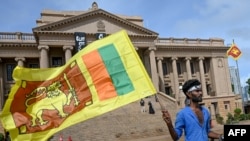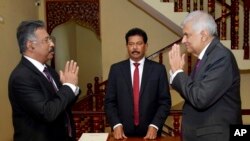In Sri Lanka, interim president Ranil Wickremesingh and former minister Dullas Alahapperuma will be the main contenders in a presidential contest that will decide who will lead the crisis-hit country facing an economic collapse and wracked by monthslong mass protests.
The 225-member parliament will vote in a secret ballot on Wednesday and the race is expected to be tight. The vote will be held a week after former President Gotabaya Rajapaksa fled the country, bringing an end to a powerful dynasty that had ruled the country for nearly two decades.
Whoever wins the race will face the tough task of winning the confidence of an angry public facing acute hardships as food prices spiral and fuel supplies run out.
“It’s tremendously important that we have a new government soon, that political stability is restored and that conversations with the International Monetary Fund for a bailout come to a fruitful conclusion,” said Paikiasothy Saravanamuttu, the head of the Center for Policy Alternatives in Colombo.
Wickremesinghe, a veteran politician and a six-time prime minister, has the backing of a faction of the ruling party, which is the largest party in parliament. But seen as an ally of the Rajapaksas, he is deeply unpopular among protestors, who held demonstrations Tuesday to oppose his candidacy.
Protestors, who burned down his residence on July 9 and occupied his office last week, have replaced cries of “Gota Go Home” with “Ranil Go Home.” They accuse him of being part of the same “system” that led to the country’s economic collapse — he was appointed as prime minister by Gotabaya Rajapaksa in May.
He has also been seen as taking a hardline stance against demonstrators as he vowed to restore law and order last week and imposed an emergency on Monday ahead of the vote.
Opposition parties also accuse Wickremesinghe of lacking political legitimacy. His United National Party was routed in the 2020 elections and holds only one seat in parliament.
Wickremesinghe will face off against Dullas Alahapperuma, a five-time lawmaker and former minister in the Rajapaksa administration who resigned in April after former president Rajapaksa dissolved his cabinet. Described as a “dark horse” in the race, he has been nominated by a breakaway faction of the ruling coalition and secured the support of the main opposition party after its candidate Sajith Premadasa withdrew.
“For the greater good of my country that I love and the people I cherish, I hereby withdraw my candidacy for the position of President,” Premadasa said in a Twitter post before parliament convened. He said his alliance will work hard to make Alahapperuma the president.
In a statement announcing his nomination last week, Alahapperuma, a former journalist turned lawmaker, called himself a “trustworthy politician” and said that he can build consensus not only among political parties but also among “religious leaders, young political activists, professionals and the wider public.”
Political analysts say he is likely to be more acceptable to protestors.
“With all the opposition votes, it is entirely conceivable that Alahapperuma will emerge as the victor,” said Saravanamuttu. “What people want to see is a degree of political stability, a reduction in the powers of the powerful executive presidency and steps to reduce people’s hardships.”
A third candidate, Anura Kumara Dissanayaka, is not seen as a serious contender, with his party holding just three seats in parliament.
The country’s new leader will be in office for the remaining of Gotabaya Rajapaksa’s term, which was to run until November 2024.
He will be in charge of a country deeply worried over how it will recover from a crisis that has seen millions go short of food due to spiraling prices, face hours of power outages and stand for days in line for fuel.





